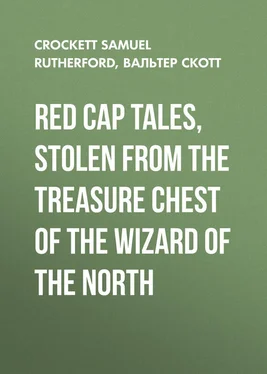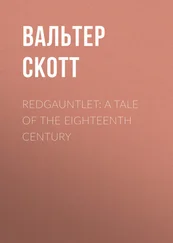Вальтер Скотт - Red Cap Tales, Stolen from the Treasure Chest of the Wizard of the North
Здесь есть возможность читать онлайн «Вальтер Скотт - Red Cap Tales, Stolen from the Treasure Chest of the Wizard of the North» — ознакомительный отрывок электронной книги совершенно бесплатно, а после прочтения отрывка купить полную версию. В некоторых случаях можно слушать аудио, скачать через торрент в формате fb2 и присутствует краткое содержание. Жанр: foreign_prose, foreign_antique, на английском языке. Описание произведения, (предисловие) а так же отзывы посетителей доступны на портале библиотеки ЛибКат.
- Название:Red Cap Tales, Stolen from the Treasure Chest of the Wizard of the North
- Автор:
- Жанр:
- Год:неизвестен
- ISBN:нет данных
- Рейтинг книги:4 / 5. Голосов: 1
-
Избранное:Добавить в избранное
- Отзывы:
-
Ваша оценка:
- 80
- 1
- 2
- 3
- 4
- 5
Red Cap Tales, Stolen from the Treasure Chest of the Wizard of the North: краткое содержание, описание и аннотация
Предлагаем к чтению аннотацию, описание, краткое содержание или предисловие (зависит от того, что написал сам автор книги «Red Cap Tales, Stolen from the Treasure Chest of the Wizard of the North»). Если вы не нашли необходимую информацию о книге — напишите в комментариях, мы постараемся отыскать её.
Red Cap Tales, Stolen from the Treasure Chest of the Wizard of the North — читать онлайн ознакомительный отрывок
Ниже представлен текст книги, разбитый по страницам. Система сохранения места последней прочитанной страницы, позволяет с удобством читать онлайн бесплатно книгу «Red Cap Tales, Stolen from the Treasure Chest of the Wizard of the North», без необходимости каждый раз заново искать на чём Вы остановились. Поставьте закладку, и сможете в любой момент перейти на страницу, на которой закончили чтение.
Интервал:
Закладка:
Yet more torn with remorse was Edward when, having once more arrived in Edinburgh, he found at last the leather valise which contained the packet of letters Alice Bean Lean had placed among his linen. From these he learned that Colonel Gardiner had thrice written to him, once indeed sending the letter by one of the men of Edward's own troop, who had been instructed by the pedlar to go back and tell the Colonel that his officer had received them in person. Instead of being delivered to Waverley, the letters had been given to a certain Mr. William Ruffin, or Riven, or Ruthven, whom Waverley saw at once could be none other than Donald Bean Lean himself. Then all at once remembering the business of the robber cave, he understood the loss of his seal, and poor Houghton's dying reproach that he should not have left the lads of his troop so long by themselves.
Edward now saw clearly how in a moment of weakness he had made a great and fatal mistake by joining with the Jacobites. But his sense of honour was such that in spite of all Colonel Talbot could say, he would not go back on his word. His own hastiness, the clever wiles of Fergus Mac-Ivor, Flora's beauty, and most of all the rascality of Donald Bean Lean had indeed brought his neck, as old Major Melville had prophesied, within the compass of the hangman's rope.
The best Edward could now do was to send a young soldier of his troop, who had been taken at Prestonpans, to his uncle and his father with letters explaining all the circumstances. By Colonel Talbot's advice and help this messenger was sent aboard one of the English vessels cruising in the Firth, well furnished with passes which would carry him in safety all the way to Waverley-Honour.
Still the days went by, and nothing was done. Still the Prince halted in Edinburgh waiting for reinforcements which never came. He was always hopeful that more clans would declare for him or that other forces would be raised in the Lowlands or in England. And meanwhile, chiefly because in the city there was nothing for them to do, plans and plots were being formed. Quarrellings and jealousies became the order of the day among the troops of the White Cockade. One morning Fergus Mac-Ivor came in to Edward's lodgings, furious with anger because the Prince had refused him two requests,—one, to make good his right to be an Earl, and the other, to give his consent to his marriage with Rose Bradwardine. Fergus must wait for the first, the Prince had told him, because that would offend a chief of his own name and of greater power, who was still hesitating whether or not to declare for King James. As for Rose Bradwardine, neither must he think of her. Her affections were already engaged. The Prince knew this privately, and, indeed, had promised already to favour the match upon which her heart was set.
As for Edward himself, he began about this time to think less and less of the cruelty of Flora Mac-Ivor. He could not have the moon, that was clear—and he was not a child to go on crying for it. It was evident, also, that Rose Bradwardine liked him, and her marked favour, and her desire to be with him, had their effect upon a heart still sore from Flora's repeated and haughty rejections.
One of the last things Edward was able to do in Edinburgh, was to obtain from the Prince the release of Colonel Talbot, whom he saw safely on his way to London from the port of Leith. After that it was with actual relief that Edward found the period of waiting in Edinburgh at last at an end, and the Prince's army to the number of six thousand men marching southward into England. All was now to be hazarded on the success of a bold push for London.
The Highlanders easily escaped a superior army encamped on the borders. They attacked and took Carlisle on their way, and at first it seemed as if they had a clear path to the capital before them. Fergus, who marched with his clan in the van of the Prince's army, never questioned their success for a moment. But Edward's clearer eye and greater knowledge of the odds made no such mistake.
He saw that few joined them, and those men of no great weight, while all the time the forces of King George were daily increasing. Difficulties of every kind arose about them the farther they marched from their native land. Added to which there were quarrels and dissensions among the Prince's followers, those between his Irish officers and such Highland chiefs as Fergus being especially bitter.
Even to Edward, Fergus became fierce and sullen, quite unlike his former gay and confident self. It was about Flora that the quarrel, long smouldering, finally broke into flame. As they passed this and that country-seat, Fergus would always ask if the house were as large as Waverley-Honour, and whether the estate or the deer park were of equal size. Edward had usually to reply that they were not nearly so great. Whereupon Fergus would remark that in that case Flora would be a happy woman.
"But," said Waverley, who tired of the implied obligation, "you forget Miss Flora has refused me, not once, but many times. I am therefore reluctantly compelled to resign all claims upon her hand."
At this, Fergus thought fit to take offence, saying that having once made application for Flora's hand, Waverley had no right to withdraw from his offer without the consent of her guardian. Edward replied that so far as he was concerned, the matter was at an end. He would never press himself upon any lady who had repeatedly refused him.
Whereupon, Fergus turned away furiously, and the quarrel was made. Edward betook himself to the camp of his old friend, the Baron, and, as he remembered the instruction he had received in the dragoons, he became easily a leader and a great favourite among the Lowland cavalry which followed the old soldier Bradwardine.
But he had left seeds of bitter anger behind him in the camp of the proud clan he had quitted.
Some of the Lowland officers warned him of his danger, and Evan Dhu, the Chief's foster-brother—who, ever since the visit to the cave had taken a liking to Edward—waited for him secretly in a shady place and bade him beware. The truth was that the Clan Mac-Ivor had taken it into their heads that Edward had somehow slighted their Lady Flora. They saw that the Chief's brow was dark against Edward, and therefore he became all at once fair game for a bullet or a stab in the dark.
And the first of these was not long in arriving.
And here (I concluded) is the end of the fifth tale.
"Go on—oh—go on!" shouted all the four listeners in chorus; "we don't want to play or to talk, just now. We want to know what happened."
"Very well, then," said I, "then the next story shall be called 'Black Looks and Bright Swords.'"
Carrying out which resolve we proceeded at once to the telling of
THE SIXTH TALE FROM "WAVERLEY"
BLACK LOOKS AND BRIGHT SWORDS
It was in the dusk of an avenue that Evan Dhu had warned Waverley to beware, and ere he had reached the end of the long double line of trees, a pistol cracked in the covert, and a bullet whistled close past his ear.
"There he is," cried Edward's attendant, a stout Merseman of the Baron's troop; "it's that devil's brat, Callum Beg."
And Edward, looking through the trees, could make out a figure running hastily in the direction of the camp of the Mac-Ivors.
Instantly Waverley turned his horse, and rode straight up to Fergus.
"Colonel Mac-Ivor," he said, without any attempt at salutation, "I have to inform you that one of your followers has just attempted to murder me by firing upon me from a lurking-place."
"Indeed!" said the Chief, haughtily; "well, as that, save in the matter of the lurking-place, is a pleasure I presently propose for myself, I should be glad to know which of my clansmen has dared to anticipate me."
Читать дальшеИнтервал:
Закладка:
Похожие книги на «Red Cap Tales, Stolen from the Treasure Chest of the Wizard of the North»
Представляем Вашему вниманию похожие книги на «Red Cap Tales, Stolen from the Treasure Chest of the Wizard of the North» списком для выбора. Мы отобрали схожую по названию и смыслу литературу в надежде предоставить читателям больше вариантов отыскать новые, интересные, ещё непрочитанные произведения.
Обсуждение, отзывы о книге «Red Cap Tales, Stolen from the Treasure Chest of the Wizard of the North» и просто собственные мнения читателей. Оставьте ваши комментарии, напишите, что Вы думаете о произведении, его смысле или главных героях. Укажите что конкретно понравилось, а что нет, и почему Вы так считаете.












